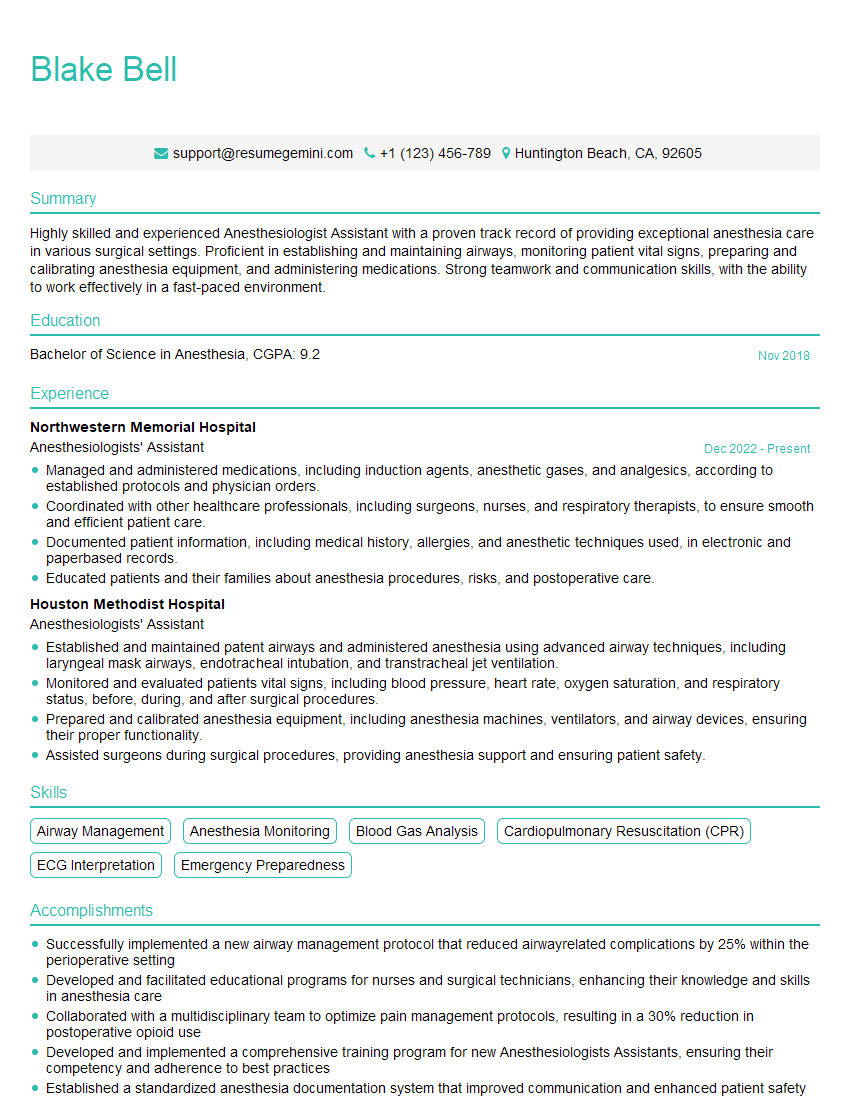Are you a seasoned Anesthesiologists’ Assistant seeking a new career path? Discover our professionally built Anesthesiologists’ Assistant Resume Template. This time-saving tool provides a solid foundation for your job search. Simply click “Edit Resume” to customize it with your unique experiences and achievements. Customize fonts and colors to match your personal style and increase your chances of landing your dream job. Explore more Resume Templates for additional options.

Blake Bell
Anesthesiologists’ Assistant
Summary
Highly skilled and experienced Anesthesiologist Assistant with a proven track record of providing exceptional anesthesia care in various surgical settings. Proficient in establishing and maintaining airways, monitoring patient vital signs, preparing and calibrating anesthesia equipment, and administering medications. Strong teamwork and communication skills, with the ability to work effectively in a fast-paced environment.
Education
Bachelor of Science in Anesthesia
November 2018
Skills
- Airway Management
- Anesthesia Monitoring
- Blood Gas Analysis
- Cardiopulmonary Resuscitation (CPR)
- ECG Interpretation
- Emergency Preparedness
Work Experience
Anesthesiologists’ Assistant
- Managed and administered medications, including induction agents, anesthetic gases, and analgesics, according to established protocols and physician orders.
- Coordinated with other healthcare professionals, including surgeons, nurses, and respiratory therapists, to ensure smooth and efficient patient care.
- Documented patient information, including medical history, allergies, and anesthetic techniques used, in electronic and paperbased records.
- Educated patients and their families about anesthesia procedures, risks, and postoperative care.
Anesthesiologists’ Assistant
- Established and maintained patent airways and administered anesthesia using advanced airway techniques, including laryngeal mask airways, endotracheal intubation, and transtracheal jet ventilation.
- Monitored and evaluated patients vital signs, including blood pressure, heart rate, oxygen saturation, and respiratory status, before, during, and after surgical procedures.
- Prepared and calibrated anesthesia equipment, including anesthesia machines, ventilators, and airway devices, ensuring their proper functionality.
- Assisted surgeons during surgical procedures, providing anesthesia support and ensuring patient safety.
Accomplishments
- Successfully implemented a new airway management protocol that reduced airwayrelated complications by 25% within the perioperative setting
- Developed and facilitated educational programs for nurses and surgical technicians, enhancing their knowledge and skills in anesthesia care
- Collaborated with a multidisciplinary team to optimize pain management protocols, resulting in a 30% reduction in postoperative opioid use
- Developed and implemented a comprehensive training program for new Anesthesiologists Assistants, ensuring their competency and adherence to best practices
- Established a standardized anesthesia documentation system that improved communication and enhanced patient safety
Awards
- Recipient of the National Board for Certification of Anesthesiology Assistants (NBCAA) Excellence in Anesthesia Care Award for outstanding contributions to the field
- Recognized by the American Association of Anesthesiologists Assistants (AAAsA) for exceptional leadership and dedication to the profession
- Honored with the Patient Safety Award for implementing innovative safety measures that significantly reduced the risk of adverse events during anesthesia procedures
- Received the Clinical Excellence Award for demonstrating exceptional clinical skills and delivering highquality anesthesia care
Certificates
- Certified Anesthesiologist Assistant (CAA)
- Certified Registered Nurse Anesthetist (CRNA)
- Basic Life Support (BLS) Certification
- Advanced Cardiovascular Life Support (ACLS) Certification
Career Expert Tips:
- Select the ideal resume template to showcase your professional experience effectively.
- Master the art of resume writing to highlight your unique qualifications and achievements.
- Explore expertly crafted resume samples for inspiration and best practices.
- Build your best resume for free this new year with ResumeGemini. Enjoy exclusive discounts on ATS optimized resume templates.
How To Write Resume For Anesthesiologists’ Assistant
- Highlight your technical skills and experience in airway management, anesthesia monitoring, and medication administration.
- Showcase your ability to work effectively in a team environment and communicate clearly with surgeons and other healthcare professionals.
- Emphasize your knowledge of anesthesia equipment and your ability to troubleshoot and resolve any issues that may arise.
- Demonstrate your commitment to patient safety and your ability to provide high-quality anesthesia care.
Essential Experience Highlights for a Strong Anesthesiologists’ Assistant Resume
- Established and maintained patent airways using advanced airway techniques, including laryngeal mask airways, endotracheal intubation, and transtracheal jet ventilation.
- Monitored and evaluated patients’ vital signs, including blood pressure, heart rate, oxygen saturation, and respiratory status, before, during, and after surgical procedures.
- Prepared and calibrated anesthesia equipment, including anesthesia machines, ventilators, and airway devices, ensuring their proper functionality.
- Assisted surgeons during surgical procedures, providing anesthesia support and ensuring patient safety.
- Managed and administered medications, including induction agents, anesthetic gases, and analgesics, according to established protocols and physician orders.
- Coordinated with other healthcare professionals, including surgeons, nurses, and respiratory therapists, to ensure smooth and efficient patient care.
Frequently Asked Questions (FAQ’s) For Anesthesiologists’ Assistant
What is the role of an Anesthesiologist Assistant?
An Anesthesiologist Assistant is a highly trained healthcare professional who works under the supervision of an anesthesiologist to provide anesthesia care to patients undergoing surgery or other medical procedures.
What are the educational requirements to become an Anesthesiologist Assistant?
To become an Anesthesiologist Assistant, you typically need a bachelor’s degree in anesthesia or a related field, followed by a two-year graduate program in anesthesiology assistant studies.
What are the key skills and qualities of a successful Anesthesiologist Assistant?
Successful Anesthesiologist Assistants have strong technical skills in airway management, anesthesia monitoring, and medication administration. They also have excellent communication and teamwork skills, and are committed to patient safety.
What is the job outlook for Anesthesiologist Assistants?
The job outlook for Anesthesiologist Assistants is expected to be excellent in the coming years due to the increasing demand for anesthesia services.
What are the earning potential and benefits for Anesthesiologist Assistants?
Anesthesiologist Assistants can earn a competitive salary and benefits package, including health insurance, paid time off, and retirement benefits.